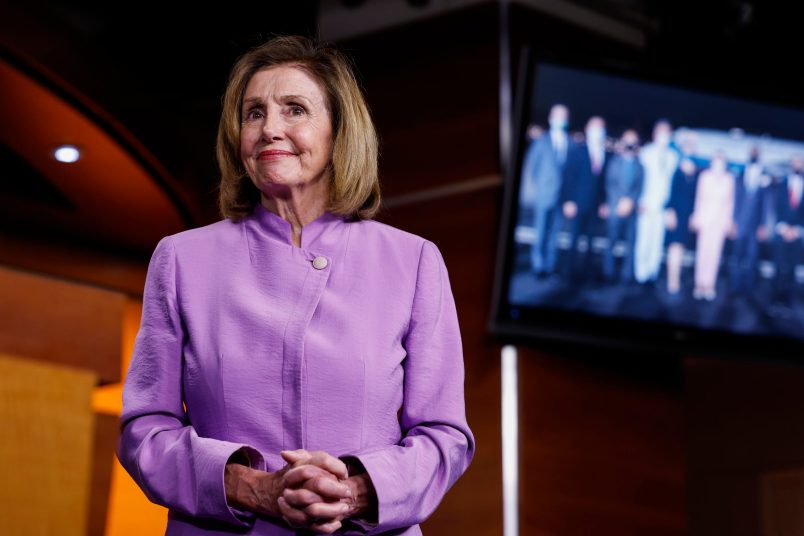House Speaker Nancy Pelosi (D-CA) announced Thursday she will not seek reelection to Democratic leadership in the next Congress, but will continue serving in her role as a representative.
Pelosi’s announcement marks a long-awaited generational sea change in the House Democratic leadership. Moments after Pelosi wrapped her speech, Majority Leader Steny Hoyer (D-MD) announced he would not seek reelection in the next Congress either. Majority Whip James Clyburn (D-SC) released a more ambiguous statement shortly after Pelosi’s speech, expressing his support for new leadership, but he has since indicated he will run for assistant leader. All three Democrats are over 80 years old and have held down the top leadership slots for most of this century.
“There is no greater official honor for me than to stand on this floor and to speak for the people of San Francisco,” Pelosi said from the House floor Thursday afternoon. “This I will continue to do as a member of the House, speaking for the people of San Francisco, serving the great state of California and defending our Constitution. And with great confidence in our caucus, I will not seek reelection to Democratic leadership in the next Congress.”
“When I first came to the floor at six years old, never would I have thought that someday I would go from homemaker to House speaker,” she added. “Now we must move boldly into the future grounded by principles that have propelled us this far and open to fresh possibilities for the future.”
Up until the moment of her announcement, it was unclear what Pelosi, the first woman to serve as House speaker, would do after it became official Wednesday evening that Republicans would take control of the House in the next Congress. She reportedly took home two versions of her planned floor speech last night and didn’t attend her Democratic caucus meeting Thursday morning, leaving even her colleagues in suspense.
Her decision has major implications as Democrats get ready to operate in a Republican-controlled House, but one with a majority far slimmer than expected ahead of the midterms.
“For me, the hour has come for a new generation to lead the Democratic Congress that I so deeply respect,” Pelosi said. “And I am grateful that so many are ready and willing to shoulder this awesome responsibility.”
Rep. Hakeem Jeffries (D-NY) is considered to be Pelosi’s likely heir, though no lawmakers have officially declared candidacy intentions for the top three leadership slots. But a group of younger Democrats have been calling for Pelosi and the rest of the leadership to all step aside.
Earlier this month, she said the attack on her husband Paul Pelosi would have an impact on her decision about her role in the next Congress. From the House floor today, she thanked her colleagues for their support in his recovery.
“For my dear husband, Paul, who has been my beloved partner in life and my pillar of support,” Pelosi said. “Thank you. We’re all grateful for all the prayers and well wishes as he continues his recovery.”
Pelosi was first elected speaker in 2007 — becoming the first women ever to be elected House speaker. She served in that role until 2011, when Democrats lost control of the House. She was elected again in 2019 and has served as speaker since then.
Over the years, the Democratic Party’s longest-serving House leader has been described as a powerful leader with a tight grip on her caucus.
Her focus on unity within her caucus led her to major legislative victories, such as helping pass the Affordable Care Act during the Obama presidency and getting an economic stimulus package sent out to help banks and others recover from the financial crisis caused by the Great Recession. More recently, under the Biden administration, she has been instrumental in passing much of President Biden’s economic agenda — like the Bipartisan Infrastructure Bill and the Inflation Reduction Act, which included historic investments in combatting climate change.
She has been one of the most prominent figures fighting to protect democracy in recent years, during a time when the the country has been more politically divided than ever. During the Trump presidency — when she successfully lead the efforts to impeach the former president twice — she was a strong opponent of much of Trump’s most divisive and problematic actions and was one of the guiding voices in Congress’s responses to the coronavirus pandemic.
She was first elected as a representative in 1987, after winning a special election to represent the 5th Congressional District for California.



